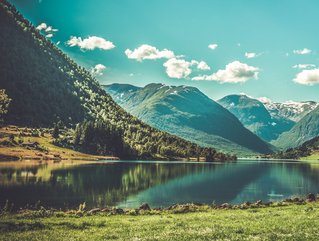Is Norway's status as a green country just an illusion?

Norway is often considered one of the greenest countries globally, ranking 14th on the Environmental Performance Index.
Norway aims to be carbon-neutral by 2030 at the earliest, quoting Nordic Research Energy: "Norway's target is to be carbon-neutral in 2030, if emissions cuts are made by other countries, and by 2050 regardless of international emission cuts".
Norway fulfils its energy needs almost entirely from hydropower, which constitutes around 95% of its total energy source in 2018. It is the law in the country for new buildings larger than 500 square metres to be built using energies from a renewable source by at least 60%. Norwegian cities are equipped with green spaces and bike lanes. On top of it, traffic is already little in the country.
As of 2021, many areas in its capital, Oslo, are already car-free. This is even truer around strategic places like schools and parks. In 2019, the Nordic country recorded zero pedestrian and cyclist deaths. Shops also reported a 10% growth in visits after the country banned cars from most of its central neighbourhoods.
Norway is expected to ban the sale of new vehicles with combustion engines in 2025. The country now has a law in place against collecting sales taxes or VAT on electric vehicles. Norway also having reduced road tax for electric vehicle owners significantly, electric vehicles receive even more incentive, making them the most economically sensible option for buyers. Norway is currently a leading market of electric vehicles in Europe.
In order to further suppress fossil fuel consumption and make the country greener, the Norwegian government has also been encouraging its citizens to burn biomass to heat their homes, with small trees, and wood residue being the most popular biomass type of choice.
In a country where the great outdoors, and Norway’s spectacular geography, is so central to people’s daily lives, this relationship with nature and natural sources of energy fits perfectly into the image.
Where Norway’s green reality slips into illusion
Despite the steps above, Norway still produced more oil per capita as of 2018 compared to the majority of countries in the world, with just Equatorial Guinea, Kuwait, Qatar, and the United Arab Emirates ranked higher.
The country gets most of its oil from deep-sea drilling operations in the North Sea, with operations in the Barents Sea becoming more productive.
2018 was also the year state petroleum company Statoil became the modern-day Equinor, which is transitioning from one of the world’s largest fossil fuel companies into a sustainable champion outwardly committing to sustainability, and has signed up to the Paris pledge.
While it is true that most of Norway's energy comes from hydropower, the country exports its oil. In fact, Norway is one of the world's top fossil fuel exporters. In many parts of the world, Norway is a major investor in fossil fuels. As much as 6.2% of Norway's Government Pension Fund, often called the Oil Fund, is invested in the international oil and gas sector.
However, that fund was originally created in the knowledge that Norway’s resource should translate into public good. It is making it possible for the country to move away from fossil fuels, much as countries in the Middle East are now trying to do.
Converting the funds from oil to a sustainable future seems like the right thing to do, even if Norway’s reputation does require a pinch of salt.






